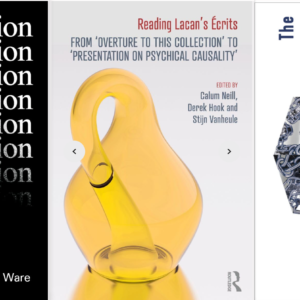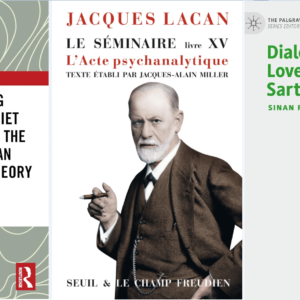News – May 2015
The NLS’s Congress on the theme Moments of Crisis took place in Geneva in May. Recordings of some of the opening talks of the Congress are available on Radio Lacan here. Despite the listing on the site, the opening address by Yves Vanderveken was given in both French and English, so English-only speakers can also follow. Further down that page Congress participants Miguel Bassols, Anne Lysy, and Véronique Voruz all give short commentaries on the event and its theme which are available entirely in English. Bassols talks about the resonance of a crisis as not simply a moment of trauma but “the moment to create something new in the subject”; while for Voruz, psychoanalysis itself is a discourse “seeking to induce a crisis in the subject”, an encounter with what Lacan labelled the signifier of the lack in the Other, or “the fundamental absence of a guarantee of the Other”. For her, although other discourses may seek to avoid the lack of a guarantee in the Other, psychoanalysis offers “a chance to confront to guarantee the absence of guarantee of the other, and of knowing how to make do” with it. The next Congress of the NLS has already been announced. It will take place on 2nd and 3rd July 2016 in Dublin. The clinical conversations will be part of the main Congress next year and therefore open to all.
With a year to go until the 10th World Association of Psychoanalysis congress in Rio, the WAP last month launched a site for the event at www.congressoamp2016.com intended to be “an open space specially designed to welcome our ideas and inventions”. The site currently contains the orientation texts on the theme of the Congress, ‘The Speaking Body: On the Unconscious in the 21st Century’ and will soon be updated with details of how to register. Alongside this, the WAP is also publishing a multilingual newsletter – Skabô – which will include orientation texts published by authors in their own respective languages. The first two editions, released last month, are available on the NLS’s site here.
Many thanks to Seve Laurent for sharing via Twitter the short account of novelist Umberto Eco’s encounter with Lacan in the early 1970s. Eco tells of his introduction to Lacan through Francois Wahl, editor of Lacan’s Écrits, who passed away last year. Eco had written about Lacan in a semi-critical (though – he is quick to point out – non-polemical) way in his La structure absente (The Absent Structure) in 1968, and had become wary that the enemies of Lacan at his French publisher Le Mercure de France were presenting him as an anti-Lacanian. He relates how Lacan invited him to lunch when the latter visited Milan in the early 1970s. When Eco had to decline on account of jet lag, Lacan delayed his flight back in order to reschedule the appointment. Eco relates that throughout their meeting they spoke neither about psychoanalysis nor semiotics, but simple “cosmic frivolities”, with Eco getting the strong impression that Lacan was eager to charm him. “Never had seduction met with such success”, he writes. However what most impressed Eco was an intervention Lacan made in the course of the apparently light conversation. Without giving details of its content, Eco realised that Lacan’s intervention was on a different stave of discourse than these “cosmic frivolities” the two were ostensibly chatting about. “We were having dinner”, he writes, “I was talking about something else, perhaps I was talking too passionately about something else and Lacan, with an air of someone talking about something else himself, dropped a word which made me see in another way an experience that I was in the process of living through and to which I was certainly referring, while pretending to talk about something else.” This is a technique many of Lacan’s analysands recall him having employed – hearing a more pertinent resonance behind the apparently banal ‘empty speech’ someone recites. “Lacan had talked absent-mindedly and had invited me to eat my Dasein” Eco writes, in a reference to Lacan’s remark in the Seminar on The Purloined Letter (Écrits, 40). “My life had changed. Lacan never knew it. And yet I believe that with his animal flair for devouring souls he had understood that in speaking of something else it is about myself that I was speaking”. Eco’s fondness for Lacan is palpable, and he remained an acquaintance until the latter’s death. He finishes with the memory of the last time he saw Lacan: sitting in Harry’s Bar in Venice, sipping on one of its famous Cipriani’s Martini. “A wonderful being, enchanting, without pity. A seducer”, Eco sums him up.
The Freud Museum in London has several events coming up in June and July that will be of interest to Lacanians. From 24th June to 5th October the Museum will be organising a ‘Festival of the Unconscious’, an exhibition and events programme marking the centenary of Freud’s 1915 paper. As part of this, on 14th July Lacanian analyst Anouchka Grose of the Centre for Freudian Analysis and Research will be speaking on ‘The Unconscious from Freud to Lacan’. Ahead of this, the Museum’s one-day conference on 13th June will ask ‘Do we need a Critical Psychotherapy?’ where speakers of a Lacanian orientation include Ian Parker and Jay Watts.
The School of the Freudian Letter will be having its second Annual General Meeting in London on 20th June, from 11am at Birkbeck, Malet St (Room MAL 253). President of the SFL, Richard Klein, will present the activities of the School with respect to the transmission of psychoanalysis in the Lacanian orientation. This will be followed at 2pm by a seminar by Petros Patounas of the School entitled ‘On the Freudian Asceticism of Lunguage’, part of the series on The Ascesis of Psychoanalysts. The talk is free and open to all.
The group Lacan Toronto has just announced its teaching programmes for the 2015-16 year. No pre-registration or fee is required for the main teaching programme, and distance attendance is available via Skype. There are also paid-for extension programmes offered through the Toronto Psychoanalytic Society and the Toronto Institute for Contemporary Psychoanalysis, where members of Lacan Toronto teach. Details of those are available here and here. Thanks to Judith Hamilton for relaying this news.
Just published as part of CFAR’s series with Karnac Books is Catherine Vanier’s Premature Birth: The Baby, the Doctor and the Psychoanalyst. This interesting contribution explores the implications of premature birth on the infant’s early relation to the Other and its caregivers, drawing from the author’s twenty years of experience in a neonatal intensive care unit. Vanier is the former president of Éspace Analytique and recipient of France’s highest honour, the Légion d’honneur.
Among other publications, Prof Stijn Vanheule in the Department of Psychoanalysis at Ghent University has made available many of his excellent papers online here. This includes his most recent co-authored paper for Frontiers in Psychology – Metaphor in psychosis: on the possible convergence of Lacanian theory and neuro-scientific research – which has just been published.
Also worth checking out is Patricia Gherovici and Jamieson Webster’s paper ‘Observations from Working with Female Obsessionals’, which is now available on the site of the European Journal of Psychoanalysis.
Thanks to Jonathan LeRoy for compiling links to all of Jacques-Alain Miller’s course L’Orientation lacanienne on his site Avec Lacan (and to Richard G. Klein of www.freud2lacan.com for the notification that these are available). Miller is Director of the Department of Psychoanalysis at University of Paris VIII and these transcripts are from his weekly seminars on Lacan’s work from 1981 to 2011. Texts are in French.
Also for French speakers, the Belgian psychoanalytic review Quatro published its latest edition last month on the the theme of psychoanalytic training. It contains articles on the control, supervision, the pass, and the end of analysis. Order it at the ECF’s shop here.
Finally, video of Marie-Hélène Brousse’s recent talk to the Irish Circle of the Lacanian Orientation on ‘Women’s bodies in the analytic experience’ is now available on YouTube, courtesy of the ICLO-NLS.
Got news? Get in touch.




Great to have this review of Lacanian resources. Will pass it along to the members of Lacan Toronto.
Succinct and accurate. Thanks for sharing. Tara